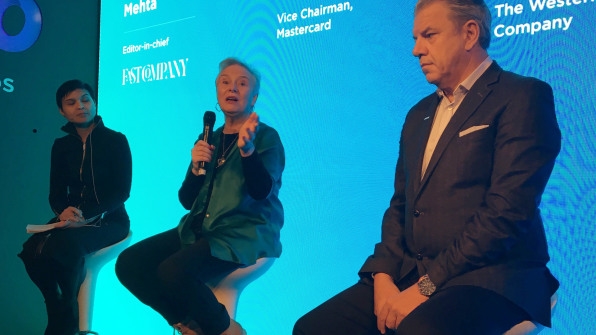The blockchain world had a rough year in 2018. What was once the hot new technology that every business flocked to became a metaphor for everything wrong with Silicon Valley’s excess and hype. Bitcoin’s value plummeted by 80% over the last year, and other coins didn’t fare much better. Despite this, crypto-evangelists have maintained that blockchain is the next generation of software architecture–one that will create more decentralized and transparent platforms.
Unsurprisingly, blockchain has been a frequent topic of conversation in Davos, Switzerland, this week, where financial leaders attending the annual World Economic Forum have discussed the subject–perhaps with a less enthusiastic tone than last year. Thursday morning, a panel of fintech leaders sat down with Fast Company‘s editor-in-chief, Stephanie Mehta, and naturally the blockchain subject was broached. They all had divergent thoughts about its future.
PayU CEO Laurent Le Moal was positively enthusiastic about the technology. The overall concept of distributed ledger technology (DLT), the payments platform CEO said, paves the way for more potentials. “That’s why we’re making investments there.” His business, which is owned by the South African media company Naspers, has been researching and funding blockchain startups for the last few years.
“Banks themselves are using [blockchains] for their own processing,” Le Moal pointed out. Not only that, but over the last year it’s become much easier for people to acquire these coins. That, along with the fact that there are more stable coins, which are tied to fiat currency, shows that there’s a future for the technology.
What the last year highlighted was the blockchain leaving its infancy. “ICO scams? Yes,” he admitted. Nine out of 10 purported coin-raising operations may have been fraudulent, he told the audience. “But there is one guy doing something right.”
Yet for people in emerging markets where the economy is constantly in flux, said Le Moal, a cryptocurrency could create a stabler economic backbone. Some currency fluctuations in certain countries are likely more drastic than bitcoin’s peaks and troughs, he mused. “It’s true that we are now coming to a point where these [blockchain] exchanges need regulations,” he added. “It is happening.”
The others, however, had a more problematized view on the blockchain’s outlook. Bitcoin, said Western Union CEO and president Hikmet Ersek, may have seemed like a way to get rich, but “it’s nothing as a value–it has no value as an economy.” Not only that, but despite the incessant press reports on the subject, the cryptocurrency is niche. “Bitcoin is used by 200,000 people,” said Ersek. “7 billion people want to day-by-day buy something.”

Mastercard vice chairman Ann Cairns echoed this sentiment. “Bitcoin behaves like a commodity; it’s unsuited right now to be a currency.” Still, she’s not discounting the technology entirely. Mastercard, for instance, has dabbled in building its own blockchains. “We are testing it with some of the biggest banks in the world,” she said.
While programs like bitcoin likely won’t be taken up by large governments or financial organizations, there are other applications for blockchain that could prove worthy. “Where it may be successful,” said Cairns, “is provenance.” For example, in the drug industry, a transparent ledger that clearly records something’s existence, could be used to ensure people are delivered the correct drugs. This type of example, she said, “shows how that new technology is about identification, value, and so on.” But that doesn’t mean it’s a viable option as an alternative to currency.
Ersek’s view may be colored because of past experience. Western Union, for instance, partnered with the cryptocurrency Ripple to test out a potential settlement system. The idea was to create a more efficient system than what the 167-year-old company currently uses. “We didn’t find the efficiency with Ripple yet,” Ersek said.
Still, all three admitted real possibilities for it–bitcoin’s value notwithstanding. “We are working [with the technology] and we are learning,” said Ersek.
Cairns was even more optimistic. “It’s not going to be a silver bullet,” she said, “but it’s going to be an incredibly useful technology.”
Davos Dialogues, a series of editorial panels, videos, and news coverage, is produced in partnership with HCL Technologies.
(14)